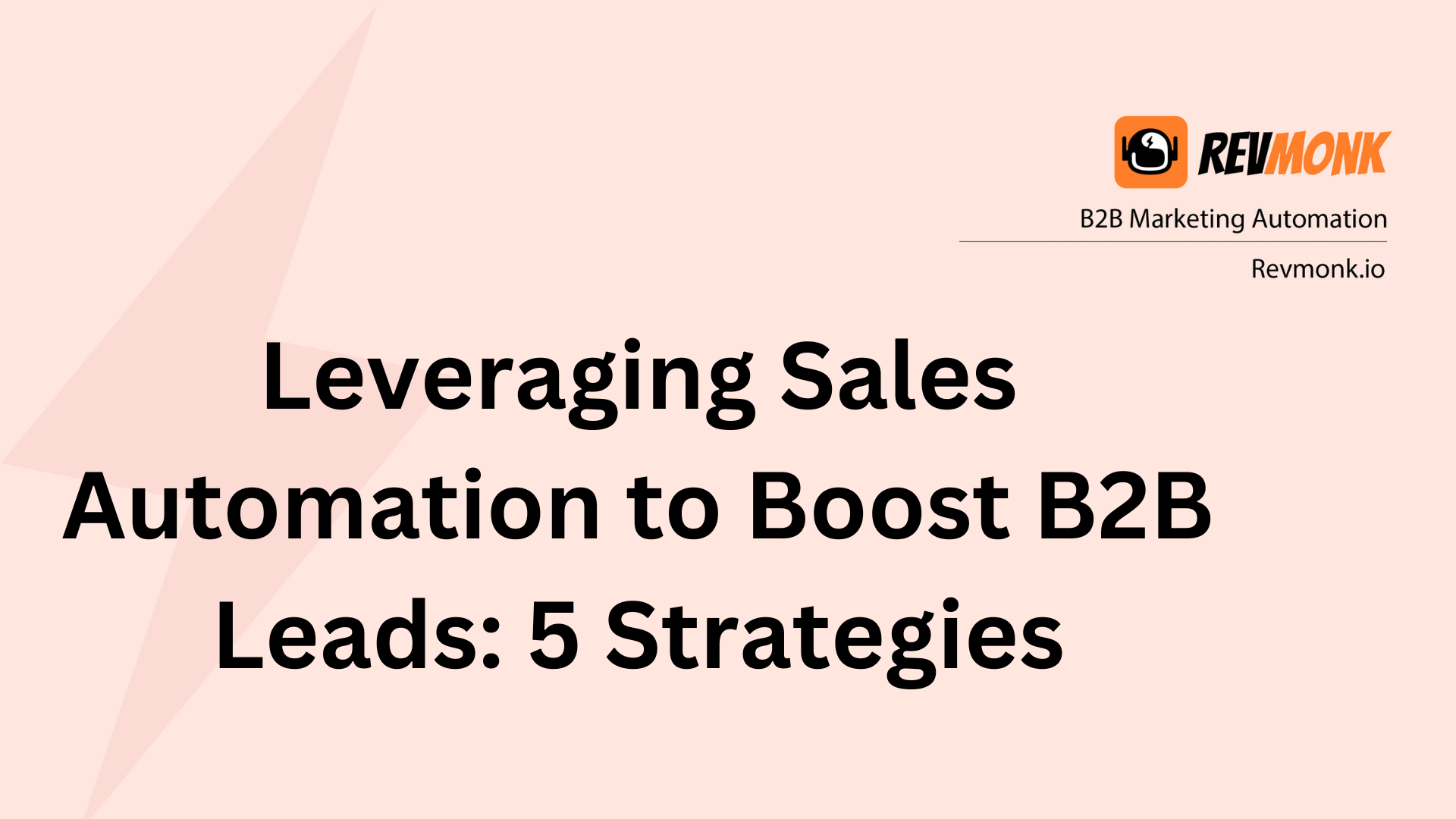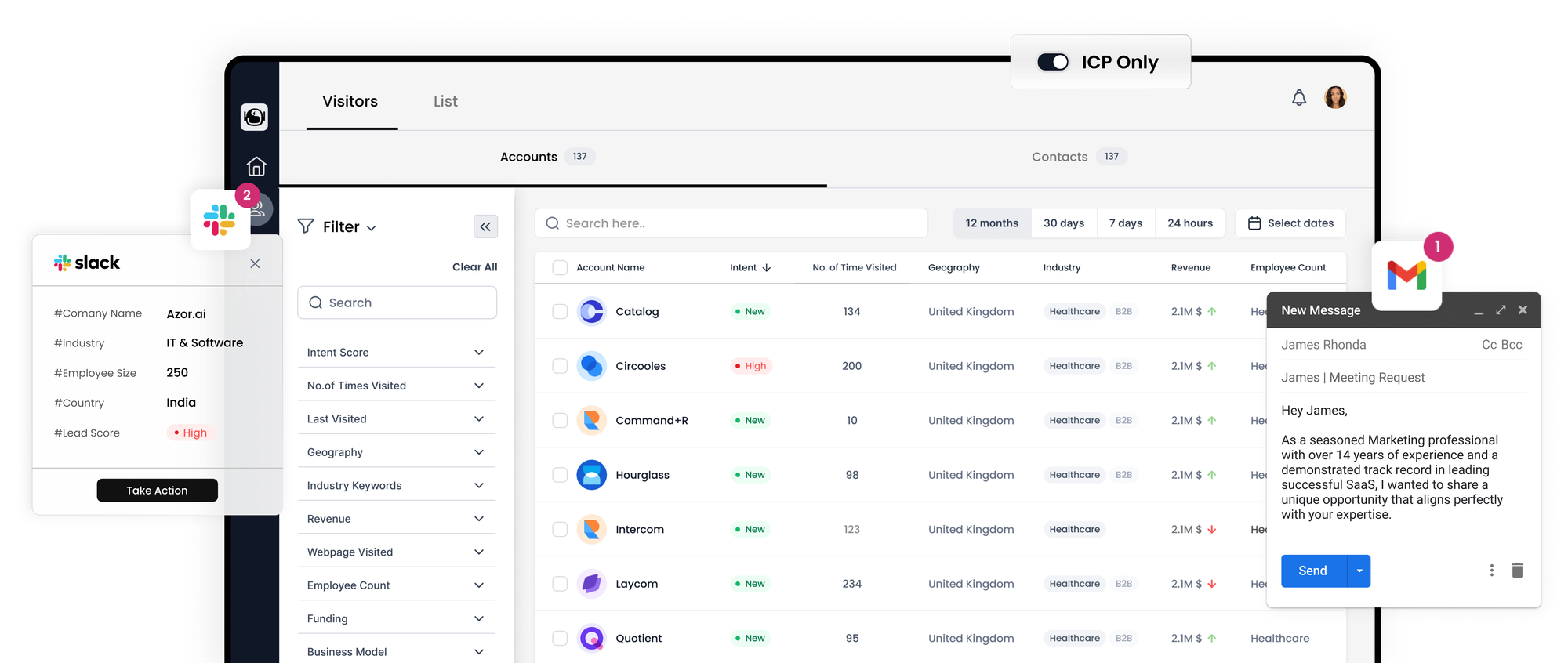Leveraging Sales Automation to Boost B2B Leads: 5 Strategies

In the relentless pursuit of achieving revenue targets, your sales team often faces uphill challenges in the B2B landscape. From prospecting and nurturing leads to ultimately closing deals, there are myriad hurdles to overcome. One of the most formidable barriers to peak sales performance, however, lies in the burden of repetitive and mechanical tasks. In fact, sales executives spend less than 40% of their time on primary sales activities. The solution? Sales automation.
Significance of Sales Automation
Sales automation offers a lifeline to optimize your sales pipeline and liberate your sales representatives from the shackles of time-consuming, routine tasks. By doing so, it allows them to redirect their focus towards more productive endeavors. The impact of sales automation on your business can be profound, and this article delves into the reasons why it matters and presents five best practices to seamlessly integrate automation into your workflows.

Importance of Sales Automation
Sales automation transcends being a mere buzzword in the sales realm. It's a game-changer for sales teams, creating an efficient and effective framework for closing deals. Traditional sales processes involve numerous repetitive steps that demand extensive manual effort. This is where automation comes into its own, revolutionizing the sales process by automating these tasks, thereby freeing up valuable time for your sales representatives. The results are clear, with 61% of businesses using sales automation reporting higher-than-expected revenues.
Moreover, the beauty of automation is its applicability to both physical and digital product sales. Below are some key benefits of sales automation:
1. Cost-Efficiency and Revenue Scaling
Automation diminishes reliance on manual labor, reducing overall expenses. Simultaneously, it has the potential to scale revenue, with businesses experiencing a remarkable 225% increase in sales opportunities through automated lead nurturing.
2. Streamlined Pipeline Management
Managing a sales pipeline is no easy feat. Automation allows you to streamline several processes, including lead generation and follow-ups, enabling you to put a substantial portion of your client acquisition strategy on autopilot.
3. Data-Driven Decision-Making
Automation provides a wealth of data for informed decision-making. Leveraging business intelligence can help you make sound choices for your company, and data analytics can expedite the decision-making process by up to five times.
4. Personalized Communication
Sales automation extends its benefits to customer retention efforts by enabling personalized communication. Whether it's an email sequence or a push notification, automation allows you to tailor your communication to build strong customer relationships.
5. Efficient and Accurate Reporting
Automation is a powerful tool for analyzing the numbers game of sales, saving countless hours typically spent compiling reports. By incorporating automation into a Customer Relationship Management (CRM) system, precise and meaningful reports are generated automatically for your team.
In summary, automation equips you with the infrastructure to unlock more revenue by optimizing your sales funnel. You have the flexibility to choose the extent of automation you wish to implement and assess the return on investment before diving deeper.
5 Best Practices for Implementing Sales Automation
Research by McKinsey suggests that over 30% of sales activities can be automated. Let's explore the opportunities within the sales process and how you can leverage them to embrace sales automation more effectively.
1. Automate Prospecting and Lead Qualification
Generating a substantial list of leads is just the first step. To maximize ROI, you must filter and prioritize these leads. This process, known as lead qualification, is often time-consuming. However, automation can streamline this process. Here's how:
- Dynamic Forms
Implement smart forms that segment leads automatically based on their characteristics, displaying only the most relevant fields. For example, a B2B company would see a different set of questions than a B2C company.
- Chatbot Conversations
Leverage chatbots to automate lead generation and qualification. Engage prospects in structured conversations to collect data efficiently.
- Lead Scoring
Automate lead scoring to assess whether a prospect is a good fit more quickly, accelerating your qualification workflow.
- Qualification Workflows
Create automated workflows that qualify website visitors based on specific actions, such as downloading an eBook or signing up for a webinar.
Automating prospecting and lead qualification can significantly expedite your sales cycle's initial stages, allowing you to focus on high-potential leads.
2. Map and Personalize the Customer Journey
Automation can enhance the customer experience throughout their journey, from initial contact to post-sale engagement. Mapping the buyer's journey enables you to create automated systems that eliminate inefficiencies:
- Targeted Communication
Automated workflows deliver content tailored to a lead's needs, progressing them through the sales funnel.
- Email Sequences
Personalize communication through email sequences, saving time by using templates and canned responses.
- Customer Support
Automate customer support processes, from live chat to self-service, to enhance customer satisfaction.
3. Targeted Reporting with Accurate Data
Shortening your sales cycle increases conversions and revenue. Sales automation plays a pivotal role in reducing cycle length. Accurate data and business intelligence are crucial components:
- CRM Tools
Utilize CRM tools to automate reporting, providing clear insights into sales performance, campaign success, growth opportunities, and goal-setting based on your sales progress.
Data and reports are essential for sales success, and automation allows you to shift your focus from manual reporting to strategic planning and execution.
4. Accelerate Social Media Outreach
Social selling can significantly boost revenue, but it often requires substantial time and effort. Automation can streamline social media outreach, making it more efficient:
Integrate sales automation tools to identify leads, send messages, and enhance sales campaigns.
Build rapport with prospects on Twitter before pitching your product or service using automation tools to find leads and send messages.
- Retargeting Ads
Automate retargeting ads to nurture collected prospects from social media.
Automating social media outreach can open new avenues for client acquisition while saving your team from the grind of constant prospecting and follow-ups.
5. Automate and Streamline Ad Campaigns
Advertising serves as a bridge between sales and marketing, and automation can strengthen this connection, directly impacting revenue. AI-powered automation offers personalization and precision in your ad campaigns:
- Customer Data Analysis
AI examines customer data, creating accurate segments and patterns, helping determine campaign impact.
- Campaign Recommendations
AI offers constructive suggestions based on customer data analysis.
- Scheduling
AI optimizes ad scheduling for peak performance based on user engagement metrics.
Automation enhances lead generation and sales through precise, AI-driven ad campaigns, fostering better coordination between your marketing and sales teams.
In conclusion, sales automation is a potent tool to future-proof your team and enhance sales success. By implementing these strategies, you can harness the full potential of sales automation, from lead generation to customer satisfaction, and chart a course towards business growth. Create a solid game plan to boost sales productivity and deliver exceptional customer experiences through automation.
